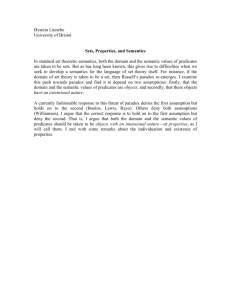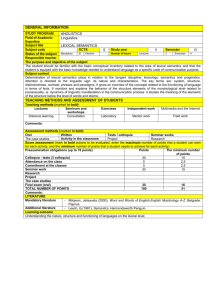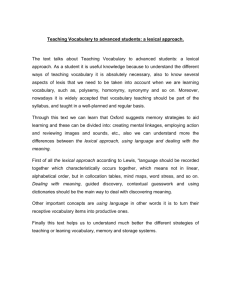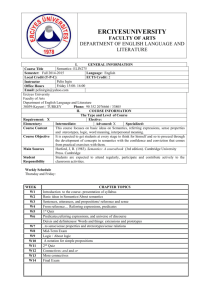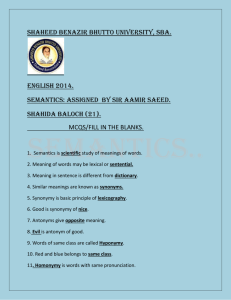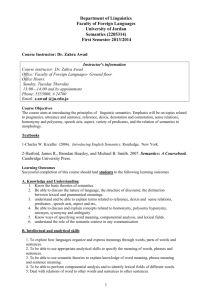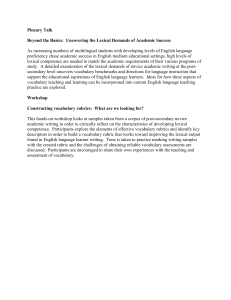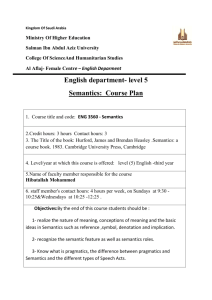LEXICAL SEMANTICS AND CHOICE OF CONTROLLER
advertisement
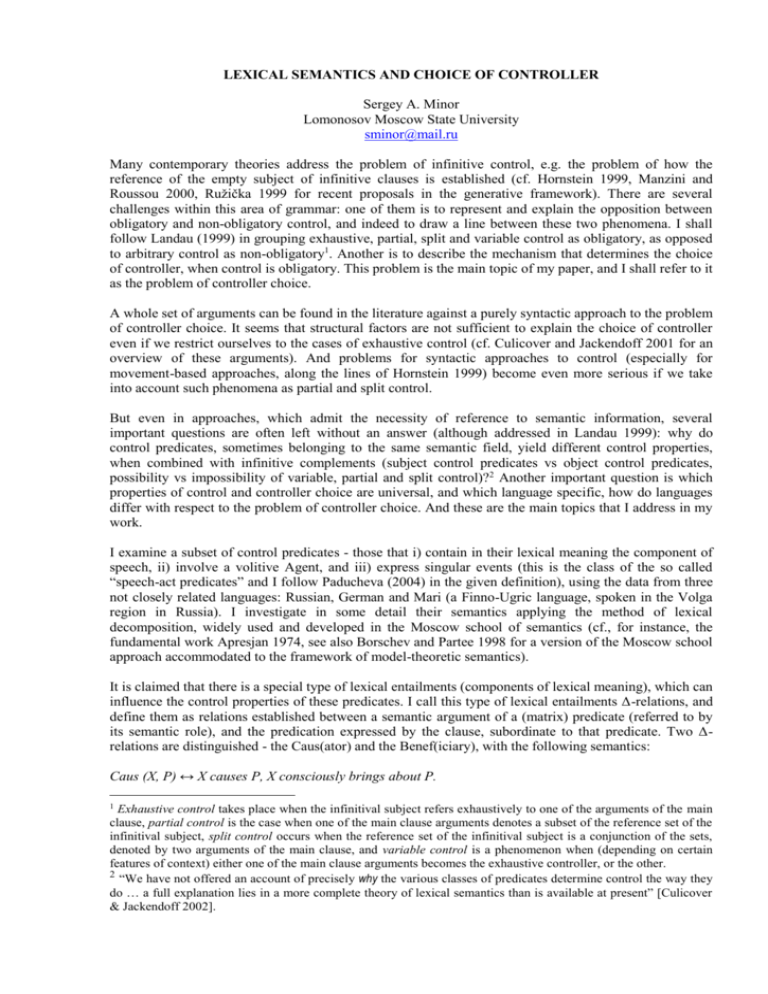
LEXICAL SEMANTICS AND CHOICE OF CONTROLLER Sergey A. Minor Lomonosov Moscow State University sminor@mail.ru Many contemporary theories address the problem of infinitive control, e.g. the problem of how the reference of the empty subject of infinitive clauses is established (cf. Hornstein 1999, Manzini and Roussou 2000, Ružička 1999 for recent proposals in the generative framework). There are several challenges within this area of grammar: one of them is to represent and explain the opposition between obligatory and non-obligatory control, and indeed to draw a line between these two phenomena. I shall follow Landau (1999) in grouping exhaustive, partial, split and variable control as obligatory, as opposed to arbitrary control as non-obligatory1. Another is to describe the mechanism that determines the choice of controller, when control is obligatory. This problem is the main topic of my paper, and I shall refer to it as the problem of controller choice. A whole set of arguments can be found in the literature against a purely syntactic approach to the problem of controller choice. It seems that structural factors are not sufficient to explain the choice of controller even if we restrict ourselves to the cases of exhaustive control (cf. Culicover and Jackendoff 2001 for an overview of these arguments). And problems for syntactic approaches to control (especially for movement-based approaches, along the lines of Hornstein 1999) become even more serious if we take into account such phenomena as partial and split control. But even in approaches, which admit the necessity of reference to semantic information, several important questions are often left without an answer (although addressed in Landau 1999): why do control predicates, sometimes belonging to the same semantic field, yield different control properties, when combined with infinitive complements (subject control predicates vs object control predicates, possibility vs impossibility of variable, partial and split control)?2 Another important question is which properties of control and controller choice are universal, and which language specific, how do languages differ with respect to the problem of controller choice. And these are the main topics that I address in my work. I examine a subset of control predicates - those that i) contain in their lexical meaning the component of speech, ii) involve a volitive Agent, and iii) express singular events (this is the class of the so called “speech-act predicates” and I follow Paducheva (2004) in the given definition), using the data from three not closely related languages: Russian, German and Mari (a Finno-Ugric language, spoken in the Volga region in Russia). I investigate in some detail their semantics applying the method of lexical decomposition, widely used and developed in the Moscow school of semantics (cf., for instance, the fundamental work Apresjan 1974, see also Borschev and Partee 1998 for a version of the Moscow school approach accommodated to the framework of model-theoretic semantics). It is claimed that there is a special type of lexical entailments (components of lexical meaning), which can influence the control properties of these predicates. I call this type of lexical entailments Δ-relations, and define them as relations established between a semantic argument of a (matrix) predicate (referred to by its semantic role), and the predication expressed by the clause, subordinate to that predicate. Two Δrelations are distinguished - the Caus(ator) and the Benef(iciary), with the following semantics: Caus (X, P) ↔ X causes P, X consciously brings about P. 1 Exhaustive control takes place when the infinitival subject refers exhaustively to one of the arguments of the main clause, partial control is the case when one of the main clause arguments denotes a subset of the reference set of the infinitival subject, split control occurs when the reference set of the infinitival subject is a conjunction of the sets, denoted by two arguments of the main clause, and variable control is a phenomenon when (depending on certain features of context) either one of the main clause arguments becomes the exhaustive controller, or the other. 2 “We have not offered an account of precisely why the various classes of predicates determine control the way they do … a full explanation lies in a more complete theory of lexical semantics than is available at present” [Culicover & Jackendoff 2002]. Benef (X,P) ↔ the occurrence of P would be relevant (good) for X, it would have a (good) effect on X. The following are examples of lexical entailments (in a slightly simplified form) for several control predicates in Russian: pros’it’ “to ask” (X, Y, P) → X says to Y that [ X thinks that Benef ( X,P) and because of that Benef (X, Caus (Y,P)) ] obeshat’ “to promise” (X, Y, P) → X says to Y that [ X knows that [ Y thinks that Benef (Y,P)] and because of that in the future Caus (X, P) ] posovetovat’ “to advise” (X, Y, P) → X says to Y that [ X thinks that Benef(Y,P) and because of that Benef (X, Caus (Y, P)) ] razreshit’ “to allow” (X, Y ,P) → X says to Y that [ X knows that [ Y thinks that Benef (Y,P)] and because of that if Caus (Y, P) than not Caus (X, bad (Y))] pozhelat’ “to wish” (X, Y ,P) → X says to Y that [ X knows that [ Y thinks that Benef (Y,P) ] and because of that X hopes that P occurs ] I shall say that an argument X is the bearer of the Δ-role K according to the lexical entailments of the predicate Q if the entailments of Q contain the formula K (X, P), where P – is the subordinate predication to Q. Thus according to the entailments of “ prosit’ “ the Agent (the first argument) is the Benef-role bearer, and the Addressee (the second argument) is the Caus-role bearer. For “ obeshat’ ” the situation is reversed. “ Posovetovat’ ” and “ razreshit’ ” imply that the Addressee bears both Δ-roles, while according to the entailments of “ pozhelat’ ” the Adressee bears the Benef-role and there is no Caus-role bearer. I propose a two-stage model, which accounts for the observed patterns of controller choice. On the first stage the set of potential controllers is determined. This procedure is based on language specific rules, which make extensive use of the notion of Δ-relations (examples of such rules for Russian and German are given below). On the second stage the potential controllers are checked for their compatibility with the thematic properties of the empty infinitival subject (“compatibility rules”). Those that are compatible are chosen as controllers (if this set includes more than one item, the expression becomes polysemic, if this set is empty, the expression is ungrammatical, as it lacks interpretation). The first-stage rule for Russian can be stated in terms of a hierarchy of Δ-relations: ‘Caus > Benef’. This means, that in Russian the matrix argument, which bears the Caus Δ-role becomes the controller, and if there is no such argument, then the argument which bears the Benef role is chosen. Partial control is not allowed. This accounts for the opposition between subject control predicate “ obeshat’ ” which entails a Caus relation between its Agent and P (see above), and object control predicates, such as “ prosit’ ”, “ razreshit’ ”, “ posovetovat’ ” (recall that according to their entailment the Addressee is the Caus-role bearer). This hierarchy also yields correct results with respect to the predicate “ pozhelat’ ”, which implies that the sole Δ-role (the Benef-role) is born by the Addressee, and it is correctly predicted to be an object control verb. The situation in Russian is compared with that in German. It is shown, that the distribution of Δ-roles between the matrix arguments of a predicate (as is entailed by the predicates semantics) plays a crucial role in restricting the possibility of variable and split control, phenomena which are almost absent in Russian3, but widely observed in German. For instance, some predicates in German, such as “versprechen” (to promise) and “bitten” (to ask), allow variable control (examples 1 and 2), while others, for instance, “raten” (to advise), “erlauben” (to allow), “verbieten” (to forbid), do not (examples 3 and 4). 1) Ich habe ihn gebeten mich zu ershiessen I asked him to shoot me 2) Ich habe ihn gebeten erschossen zu werden I asked him to arrange that I get shot 3) Ich habe ihm erlaubt mich zu ershiessen I allowed him to shoot me 3 Some interesting exceptions to this general rule are also discussed. 4) *Ich habe ihm erlaubt erschossen zu werden I allowed him to arrange that I get shot This is accounted for by stating a different first-stage rule for German, which includes all the Δ-role bearers of a predicate into the set of potential controllers. Thus, for “bitten” and “versprechen” both Agent and Addressee shall be included into this set, and the choice of the actual controller is carried out on the second stage (thus, according to the “compatibility rules” in sentence 1 the Addressee is chosen as controller, and in sentence 2 – the Agent). On the other hand, according to the entailments of the predicates “raten”, “erlauben” and “verbieten” the Addressee bears both Δ-roles, and the Agent bears none, thus our rule correctly predicts that their Agents shall not become controllers whatever the thematic properties of the infinitival subject. If these properties are incompatible with the Δ-role of the Addressee the sentence becomes simply ungrammatical, no “control shift” occurs (as in example 4). Thus, in this paper I adopt the point of view, according to which the ultimate answer to the question, why the control properties of predicates are such as they are, lies in the realm of lexical semantics (at least for a class of control predicates). And I undertake an attempt to establish those components of lexical meaning, which influence control properties of speech-act predicates. References: Apresjan 1974: 'Leksicheskaja sementika. Sinonimicheskije sredstva jazyka' (Lexical semantics. Means of synonymy in language). Moscow: Nauka. Borshev & Partee 1998: 'Formal and lexical semantics and the genitive in negated existential sentences in Russian'. In Formal approaches to Slavic Linguistics 6: The Connecticut Meeting 1997 , eds. Željko Boskovic, Steven Franks and William Snyder. 75-96. Ann Arbor: Michigan Slavic Publications. Hornstein 1999: 'Movement and control'. Linguistic inquiry 30, 69-96 Jackendoff 1972: ‘Semantic interpretation in generative grammar’. Cambridge, Mass: MIT Press Landau 1999: ‘Elements of control’. Ph.D. Dissertation, MIT, Cambridge, Mass. Landusaw & Dowty 1988: ‘Towards an nongrammatical account of thematic roles’, in Wendy Wilkins (ed.)‘Thematic relations’. (Syntax and semantics 21) San Diego, Ca.: Academic Press Manzini & Roussou 2000: 'A minimalist theory of a-movement and control'. Lingua 110/409-447 Paducheva 2004: ‘Dinamicheskije modeli v semantike leksiki’ (Dynamic models in the semantics of lexical items). Moscow: Jazyki slavjanskoj kultury. Ružička 1999: ‘Control in Grammar and Pragmatics. A cross-linguistic study’. Linguistik Aktuell 27, Amsterdam, The Netherlands: John Benjamins
